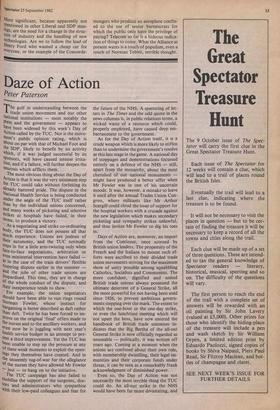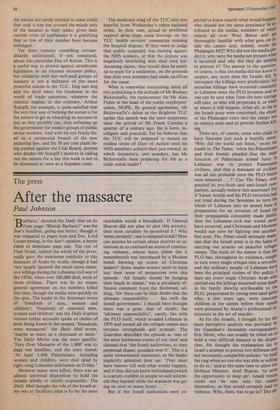Daze of Action
Peter Paterson
The gulf in understanding between the trade union movement and our other national institutions — most notably the Press and the government — appears to have been widened by this week's Day of Action called by the TUC. Nor is the move- ment's public opinion rating, which is about on par with that of Michael Foot and the SDP, likely to benefit by an activity Which, if it was judged successful by its sPonsors, will have caused intense irrita- tion, and if a failure, will further deepen the neurosis which afflicts them.
The most obvious thing about the Day of Action is that it was the very minimum step the TUC could take without forfeiting its already battered pride. The dispute in the National Health Service is being conducted under the aegis of the TUC itself rather than by the individual unions concerned, and many weeks of picketing and selective strikes at hospitals have failed, in their terms, to produce a victory.
As a negotiating and strike co-ordinating 1104, the TUC does not possess all that Much experience. Unions are jealous of their autonomy, and the TUC normally steps in for a little arm-twisting only when face-to-face negotiations, arbitration or even ministerial intervention have failed as in the case of the train drivers' flexible rostering dispute earlier in the summer and the jobs of other trade unions are jeopardised. This time, they are in charge of the whole conduct of the dispute, and their inexperience tends to show. For example, the union negotiators should have been able to run rings round Norman Fowler, whose instinct for bargaining is better described as daft rather than deft. Twice he has been forced to im- prove on the original 'final' offers made to the nurses and to the ancillary workers, and even now he is juggling with next year's health service budget in an attempt to pre- sent a third improvement. Yet the TUC has been unable to step up the pressure at any of these weak moments to exploit the open- ings they themselves have created. And in the unseemly tug-of-war for the allegiance of the nurses they have allowed Mr Fowler
just — to hang on to the initiative.
The TUC campaign has also failed to mobilise the support of the surgeons, doc- tors and administrators who sympathise With their low-paid colleagues and fear for the future of the NHS. A spattering of let- ters in The Times and the odd quote in the news columns is, in public relations terms, a wicked waste of a resource which could, properly employed, have caused deep em- barrassment to the government.
As for the Day of Action itself, it is a crude weapon which is more likely to stiffen than to undermine the government's resolve at this late stage in the game. A national day of stoppages and demonstrations focussed entirely on a defence of the NHS — still, apart from the monarchy, about the most cherished of our national monuments might have produced a better offer when Mr Fowler was in one of his uncertain moods. It was, however, a mistake to leave it until after the annual Trades Union Con- gress, where militants like Mr Arthur Scargill could cloud the issue of support for the hospital workers with a crusade against the new legislation which makes secondary picketing and sympathy strikes unlawful, and thus invites Mr Fowler to dig his toes in.
Days of Action are, moreover, an import from the Continent, once scorned by British union leaders. The propensity of the French and the Italians to mount such ef- forts were ascribed to their divided trade union movements striving for the maximum show of unity possible among squabbling Catholics, Socialists and Communists. The more confident, dignified and united British trade unions always possessed the ultimate deterrent of a General Strike, all the more powerful for not having been used since 1926, to prevent ambitious govern- ments stepping over the mark. The extent to which the one-hour or the one-day strike, or even the lunchtime meeting which will not upset the boss, have now entered the handbook of British trade unionism in- dicates that the Big Bertha of the all-out General Strike is now officially regarded as unuseable — politically, it was written off years ago. Coming at a moment when the unions are confused about their own role, with membership dwindling, their legal im- munities and their corporate funds under threat, it can be seen as a remarkably frank acknowledgment of diminished power.
Even so, the Day of Action was not necessarily the most terrible thing the TUC could do. An all-out strike in the NHS would have been far more devastating, and the unions are surely entitled to some credit that such a step has crossed the minds only of the lunatics in their ranks: given their current crisis of confidence it is gratifying that so few of their number have become unhinged.
Yet there remains something extraor- dinarily unfocussed, if not unnatural, about this particular Day of Action. This is a useful way to protest against unwelcome legislation or an irksome incomes policy, but solidarity with less well-paid groups of workers is not a hallmark of the more powerful unions in the TUC. Dog eats dog and the devil takes the hindmost in the world of trade unionism, whatever the rhetoric implies to the contrary. Arthur Scargill, for example, is quite satisfied that the very best way of helping the nurses is for the miners to get as whacking an increase in pay as they possibly can, thus softening up the government for weaker groups of public sector workers. And with his eye firmly fix- ed on a ceremonial breach of the new picketing law, and the 30 per cent claim be- ing pushed against the Coal Board, anyone who doubts Mr Scargill's motives in calling out the miners for a day this week is not to be dismissed at once as a hopeless cynic. The moderate wing of the TUC also sees benefits from Wednesday's token national strike. In their case, actual or proffered support gives them some leverage on the TUC health services' committee running the hospital dispute. If they were to judge that public sympathy was turning against the NHS workers, or that the dispute was hopelessly interfering with their own for- thcoming claims, they would then be entitl- ed to push for a settlement, on the grounds that their own members had made sacrifices for the cause.
What is somewhat astonishing amid all this politicking is the attitude of Mr Rodney Bickerstaffe, the replacement for Mr Alan Fisher at the head of the public employees' union, NUPE. By general agreement, Mr Bickerstaffe's debut at the Brighton TUC earlier this month was the most auspicious since the arrival of Mr Frank Cousins a quarter of a century ago. He is keen, in- telligent and practical. Yet he believes that the TUC will be prepared to mount an endless series of Days of Action until his NHS members achieve their just reward. In which monastery, one wonders, has Mr Bickerstaffe been preparing for life as a trade union leader?



































 Previous page
Previous page